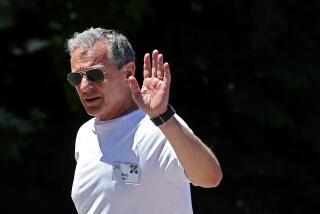Warner Bros. lays groundwork for succession
Time Warner Inc. Chief Executive Jeff Bewkes, readying a management succession plan at Warner Bros., has asked studio Chairman and Chief Executive Barry Meyer to remain on board for an additional two years and named three top executives to a newly formed Office of the President.
Under the realignment, studio President and Chief Operating Officer Alan Horn, who has been in his job 11 years, will step down in April — eight months earlier than planned — and become a consultant until Meyer retires in December 2013.
Both Meyer and Horn were given two-year contract extensions last year and were originally expected to depart at the end of 2011. Bewkes said he was extending Meyer’s contract because he wanted to ensure a smooth transition to the new management team. The move scotches speculation that Bewkes would reach outside the studio to find new leadership.
“We’re ready to start the succession process now,” Bewkes said.
To that end, the Time Warner chief created the Office of the President to bring together three of the studio’s top managers: Warner Bros. Motion Pictures Group President Jeff Robinov, who will become the studio’s top film executive with green-light authority when Horn leaves; Warner Bros. Television Group President Bruce Rosenblum; and Home Entertainment Chief Kevin Tsujihara.
All three executives will retain their current duties and take on broader responsibilities for operations of the studio, helping strategize business initiatives as distribution platforms for entertainment continue to converge and traditional models get redrawn by new technologies.
“All these business models need to have a rigorous debate,” Bewkes said. “These three will work as a unit toward evolving Warner Bros. to the next era of being a more digital and more global company.”
Bewkes is now making it very clear that he has no plans to bring in an outsider to run Warner Bros. after Meyer leaves. “We think we have succession inside Warner Bros.,” he said.
But some inside the studio fear that placing Robinov, Rosenblum and Tsujihara on an equal footing will only ratchet up competition over the chief executive role, creating a public contest that undermines stability.
Bewkes said that wouldn’t be tolerated: “Neither Barry or I like or value jockeying, and anyone who does it eliminates themselves.”
Warner Bros. has long prided itself on orderly management, with the prior regime of Bob Daly and Terry Semel lasting for two decades. Meyer, who has worked at Warner Bros. for nearly four decades, said he wanted the next generation to carry on that tradition.
“I’m here to help these three guys grow into the senior management of the company and help them move a step beyond each of their businesses to understand how they are interlocked with each other,” he said. “The digital transition has taught us that these businesses don’t exist in silos.”
Meyer has played a key role in navigating Warner Bros.’ transition in the digital age, and with Horn has delivered reliable profits in film, TV and home entertainment, with such movie franchises as “Harry Potter” and “Batman” and popular TV shows such as “Two and a Half Men” and “The Big Bang Theory.”
Warner Bros. now accounts for 43% of Time Warner’s annual revenue and 23% of operating income, Bewkes said, identifying the studio’s priorities as continuing to develop hit movies and TV series and evolving business models to make content available in all formats and for global audiences.
Horn admitted he had bittersweet feelings about leaving. He’s been grooming Robinov for the top movie job, handing him additional responsibilities for physical production, music and marketing and distribution, while lessening his own workload.
“Sure, it’s uncomfortable being the only one leaving and having Barry stay and the others promoted,” he said, “but having given away much of my portfolio, and my work having gone down considerably, it’s time to find something more interesting.”
Robinov is credited with helping Horn shape the studio’s “event film” strategy, which has paid off handsomely with the “Harry Potter” franchise and such hits as director Chris Nolan’s “The Dark Knight” and “Inception.” Robinov, a former talent agent who joined Warner in 1997, is known for having an edgier taste than Horn and has pushed for films such as “Inception” and the raunchy comedy “The Hangover.”
claudia.eller@latimes.com
More to Read
The biggest entertainment stories
Get our big stories about Hollywood, film, television, music, arts, culture and more right in your inbox as soon as they publish.
You may occasionally receive promotional content from the Los Angeles Times.










